Practical information
| Sep | 2022 |

Day 2
- discussions
- workshops
- rituals
Programme
Waterbus to the Urban Farm
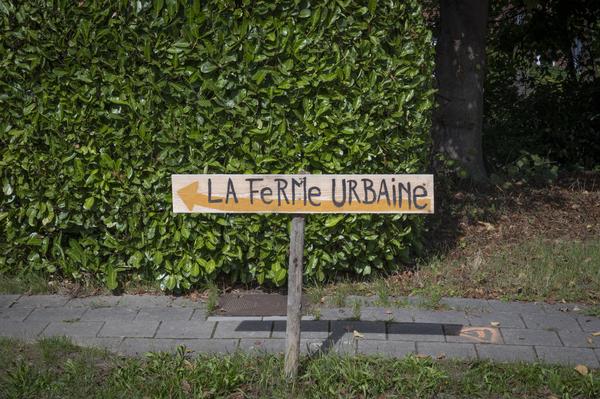
- 09:30
- Super Terram - Meeting point at Waterbus Stop, Quai des Péniches 5
- 10:00
- Super Terram - Departure with waterbus
- 10:38
- Super Terram - Arrival with waterbus + walk to the Urban Farm
Morning at the urban farm
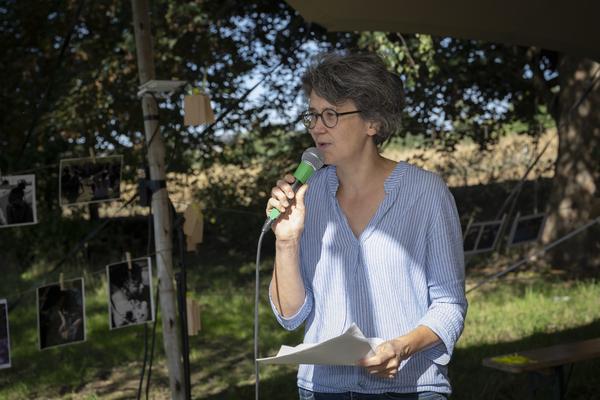
- 11 …
Programme
Waterbus to the Urban Farm

- 09:30
- Super Terram - Meeting point at Waterbus Stop, Quai des Péniches 5
- 10:00
- Super Terram - Departure with waterbus
- 10:38
- Super Terram - Arrival with waterbus + walk to the Urban Farm
Morning at the urban farm

- 11:15
- Keynote by Chloé Deligne
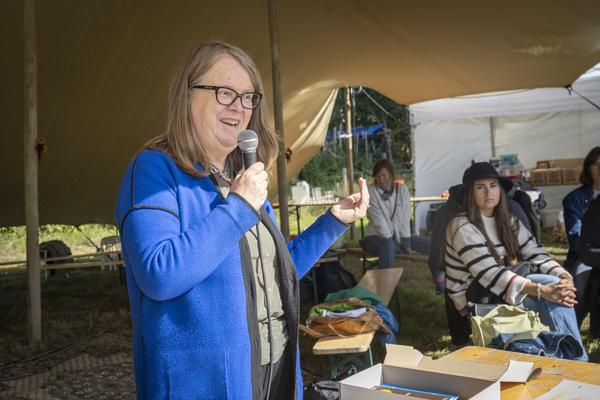
- 11:50
- Round Table with Wapke Feenstra, Back2SoilBasics and Alix Gigot
- 12:50
- Questions
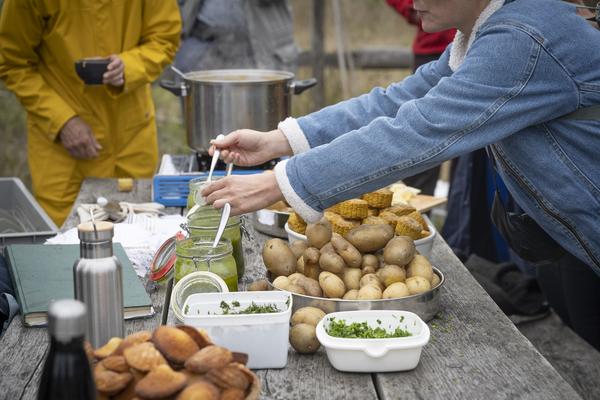
- 13:00
- Vegetarian lunch
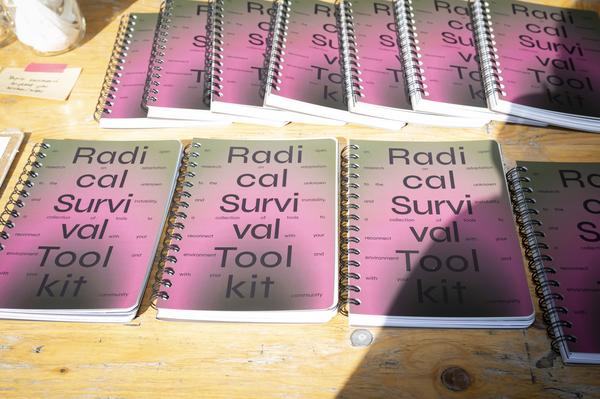
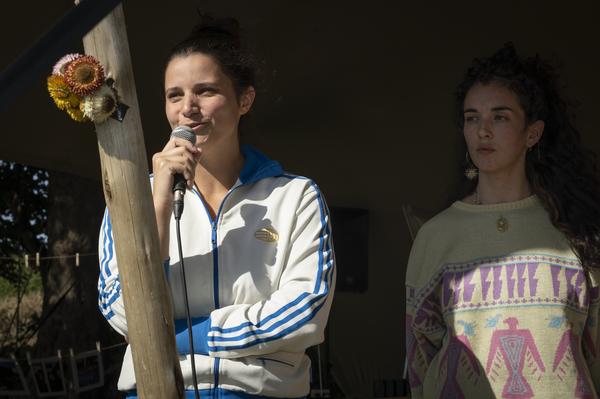
- 14:15
- Presentation of Radical Survival Toolkit / MOSSS
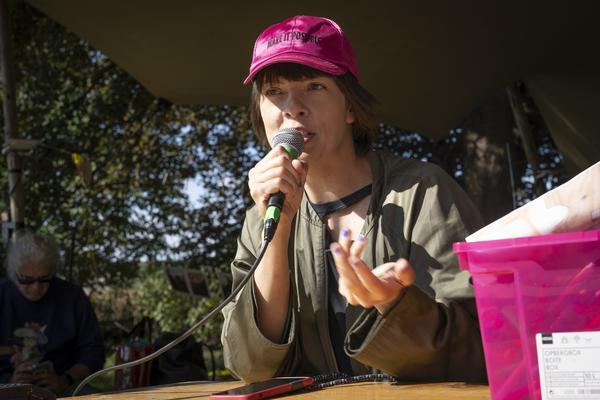
- 14:30
- Presentation of artwork by Alicja Rogalska
- 14:50
- Susbcription to workshops
- 15:00
- Workshop with Wapke Feenstra, ritual with Zoë Palmer, performance by Gosie Vervloessem
- 17:15
- Conclusion
- 17:45
- Ending ritual by Zoë Palmer
Throughout the day, participants were invited to co-create ‘weave between worlds’ a mandala using a combination of collected urban and rural foraged materials as well as wildflower seeds. Our final act of the day was the collective composting of this work – participants are invited to scoop up a bag and take it home to be spread in their local community. We will reflect on the value of moving away from hierarchy and colonial mindsets honouring multiple ways of knowing. This ritual culminated in a joyful sharing of home-made botanical mocktails as we raised a glass to the land, each other and our collective acts of co-creation.
- 18:30
- Drinks
Speakers
Kinch / Super Terram (BE)
Since the summer of 2022, Studio1Bis for Super Terram has been collecting ‘soil stories’ of a diversity of actors engaging with various sites around SchaerbeekVorming (Moeraske, Stephenson, Buda,…). These stories aim to unfold previously hidden relationships between citizens, researchers, professionals and living soils in the Brussels context, as well as their relationship with soils elsewhere (e.g. soils from their childhoods or memories). We shared these stories during a boat trip passing by areas in the Northern fringe of Brussels, composting them with new narratives originating from conversations with the participants on the boat.
Super Terram is a co-creative research project that focuses on Brussels soils and the life contained within them. By looking at the soil with renewed eyes, they want to find new ways to rethink the city, with an increased sensitivity to our environment and in greater connection with what lives underground. Through experiments and actions of various kinds, they question our relationship to soil.
bral.brussels/fr/artikel/superterram-la-recherche-du-monde-cach-sous-nos-pieds
Chloé Deligne (BE) / Brussels, our relation to the soil
For the Feral festival, Chloé Deligne proposed a journey through time and space in 'Brussels' in search of the interweaving of 'the city' and 'the countryside' since the late Middle Ages. This imaginary journey, carried out through maps and images from the past (or present), and texts, lead us to revisit the binarity between the rural and the urban and to question these concepts' meeting points, and obstacles at different moments in history.
Chloé Deligne (°1972) is a historian, ecologist and geographer. She is a researcher at the FNRS and a teacher at the ULB in Brussels. Her work is generally long-term and explores two major themes, which often intertwine: urban history and environmental history. Starting from the Brussels prism, she explores the transformations in the relationship between cities and water, between cities and pollution, and more recently between cities and food production. Her research is characterised by diachronicity and interdisciplinarity and, moreover, by the desire to build knowledge and actions with a variety of audiences by seeking to give historical depth to issues of political ecology. She has published several works devoted to the forces and issues at stake in the major transformations of Brussels (Bruxelles et sa rivière, 2003; L'expo 58, un tournant dans l'histoire de Bruxelles, 2009) or to the ecological dimensions of its history, notably through the publication of the book Terres des villes, Enquêtes potagères de Bruxelles aux premières saisons du 21e siècle.
https://innoviris.brussels/fr/stories/chloe-deligne-0
Wapke Feenstra / Myvillages (NL/UK)
The Rural School of Economics is an extension of Myvillages’ ongoing work to acknowledge and share rural knowledge in collaboration, like e.g. the Eco Nomadic School and collaborative peer-to-peer learning with farmers. As contemporary rural culture has the knowledge of how to adapt to a place and the ability to connect with the non-human, it should be no news that we can learn from the rurality in town. We do that by working in non-lingual and alternative learning sessions using pedagogics in transparent ways and test them by doing.
Our school constantly moves between rural places, and between everyday spaces and art spaces. The network of the RSoE includes village committees, farmers associations, regional scientists, international artists, museums and now Cifas in Brussel.
It is time and urgent for rural culture to reclaim a role in the urban gaze that is dominant in art and culture and we want to contribute to the building of a collective future, with an interdependent rural and urban. The city of the future will benefit from other forms of knowledge, which will engender a revised set of values and alternative ways of seeing.
Wapke Feenstra is a co-founder of Myvillages (2003), an artist collective set up to advocate for a new understanding of the rural as a place of and for cultural production. They work with formats that are close to the everyday – a communal lunch, a slide show in the village hall, a walk across the fields, a market stall. Drawing as a method of learning and connecting Myvillages uses from the start. They have set up long-term and ongoing trans-local infrastructures to make connections between people and places, such as the International Village Shop and the Rural School of Economics. Feenstra lives and works in Rotterdam. Her recent commissions include the Galerie für Zeitgenössische Kunst Leipzig, Times Museum in Guangzhou, OK_Video in Jakarta, Whitechapel Gallery in London, Potato Growers at the Istanbul Biennale 2019 and with Rural School of Economics she is now a part of an experimental network of knowledge production in Lumbung documenta fifteen in Kassel.
Oscar Cassamajor & Valérie Maione / Back2SoilBasics (BE)
Back2SoilBasics is a network of people guided by the power of mother nature. We base our practices around earth regeneration through mind, soul and soil knowledge. We share basic tools for permaculture in an urban context as a resilient practice made accessible. We focus on people of colour, local communities or people with less access to nature. Our approach is to create an open school session where each person is part of a valid information exchange. The project is actively held by Valérie Maione and Oscar Cassamajor.
Oscar Cassamajor is a Brussel based artist with Belgium and Hatian roots. Their arts have sprong off with performance art to visual performance installation and theatre. Visual engineering is a mental and physical space. Today their art practice is about forming a community and a netwerk of earth regenerative practices and socio-cultural skills. where their art becomes the tool to design, communicate and experiment in different educational approaches. Education becomes a medium to incubate Permanent Culture as a way to survive, sustain and live. In this journey art became the art of living and co-living and the creation of its necessities.
Valerie (she/he) is a young holistic herbalist. He would like to develop his life via the healing and wellness path, as his grandmother, an indigenous Venezuelan, did before her. He wants to help himself first as a person with reduced mobility and then project his pure light and sparkling wisdom to others. Her goal is to pass on her love and work for nature: at only 22 years old, she has already worked in an organic farming field, worked for several esoteric herbalist shops on the internet or on markets, and gives energetic massages to those who ask for it in a framework of absolute benevolence. If he became a herbalist, it is above all to share the knowledge of medicinal plants that he considers universal, through their botanical recognition, their culture and their uses. She believes that "to help" is the verb that directs her life. She is an empath and knows how to relate to people in difficulty and wants to show them how it is possible to live ecologically and sustainably while having a difficult situation.
Alix Gigot / La Semeuse, Laboratoires d’Aubervilliers (FR)
In 2010, the artist-architect Marjetica Potrč, in collaboration with RozO Architects, started the research entitled La Semeuse ou le devenir indigène, linking plant biodiversity and the cultural diversity of the city of Aubervilliers. Today, La Semeuse is a garden shared between the inhabitants and Les Laboratoires d'Aubervilliers, a place of experimentation and creation. It is an organically organised project that federates links between humans and their space, in order to collectively imagine a more cheerful future, or even a future at all in the context of the city's development. Through actions such as gardening -that bears social values- and more theoretical and artistic reflections on the future of life in the city and collective actions, La Semeuse aims to involve everyone so that every gesture towards urban space is perceived as a great decision to appropriate the territory and has great repercussions. Camille Gigot is currently the project coordinator and gardener.
http://www.leslaboratoires.org/article/les-ateliers/la-semeuse-lieu-de-r...
Common Dreams School / MOSSS (BE)
In 2020 - 2021, the Cifas invited the artist and environmental activist Maria Lucia Cruz Correia to create a Brussels edition of the Common Dreams School, an eco-pedagogical collective project led with the purpose of exploring, imagining, and creating alternatives to face climate change.
At the end of the process, the group expressed the desire to create a publication that would serve as documentation of the project as well as a toolkit accessible to others. That is how was born the Radical Survival Toolkit. This publication is a selection of tools and reflections from the Common Dreams School and elsewhere, as well as new writings related to the themes of the project. It offers open research on adapting to the unknown and instability, and questions itself through different forms about the possibilities of a more desirable world.
The MOSSS collective composed of Mélanie Ganino, Sarah Drapeau and Delphine Mertens was born from the creation of this publication. Supported by Cifas and the Common Dreams School, they carried the publication project and will present it to you at Feral.
Gosie Vervloessem / The Sick Detective (BE)
The True Nature Of Bruxelles.
Gosie Vervloessem, aka the Sick Detective, guided us through the botanological map of the magical pentagon to explore her very intimate relationship with some particular plants in Brussels. The garden of Eden, the horror garden gets plowed, a landscape of emotions surfaces and reveals the true nature of the swamp city.
Gosie Vervloessem’s artistic research focuses on the position of the researcher in times of multiple crises. Her work faces the challenges that arise within this role, and looks for new ways of producing knowledge. She focuses mainly on the concept of nature and tries to unravel the ideas that underpin this concept. In doing that, she identifies herself as a Sick Detective, a character that involves the vegetal kingdom as a possible ally in her research.
https://wpzimmer.be/en/artists/gosie-vervloessem/
Zoë Palmer (UK)
Rest - dreams - weaving
In a world in which our dreams have been colonized, collectively venerating our dreams is a radical act. How can we create space for nature to dream through us? How can we work with plants to cultivate our inner dream gardens?
This workshop incorporated meeting plants of the herb garden through a decolonized frame, guided herbal tea tasting (local herbs), daytime rest as well as dream sharing in small groups. Exploring our ancestral ecologies, we worked in small groups, sharing stories of our ancestors and their connection to the land. We asked – who are the ancestors of this land? Who was historically afforded rest and leisure in rural landscapes, who has been excluded? To whom do we offer the gift of rest and nature connection? We extend these gifts to the more than human world. What are the ecosystems, the plants, animals, funghi that need our attention?
This workshop culminated in the co-creation of a portal for rest and repair. As part of this practice, participants were invited to create an offering by mixing a mocktail from the menu of our decolonized apothecary.
Wapke Feenstra (NL)
The Rural Undercurrent
Every city – also Brussels - has an important rural undercurrent that is largely paved over, and with Cifas attempted dig within the city to make it recognisable and shareable in a long term exploration with citizens. The undercurrents lie within urban growing and local food initiatives, come from a not-distant agricultural Umland, live in the mind-set of residents whose families come from the countryside. For the workshop we made a start at drawing methods like Plein Air, Trans-Local Drawing, Geological and Economic Drawing. Some of these techniques were explored in a learning-by-doing session.
It is time for rural culture to reclaim a role in the urban gaze that is dominant in art and culture and we want to contribute to the building of a collective future, with an interdependent rural and urban. The city of the future will benefit from other forms of knowledge, which will generate a revised set of values and alternative ways of seeing.